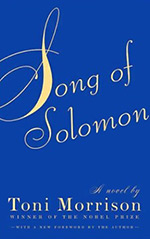
![]() bazhsw
bazhsw
3/15/2024
![]()
This book is stunning. Upon it's conclusion I needed to sit and exhale and let all the emotions I was feeling fall over me. All day long I have been thinking about the characters, the themes, what the book is about and what it means. It's a book which draws you in, you're not sure what it is about but each chapter not only tells you a little more, it makes you reconsider your perspectives as you learn what is happening in the world from another characters point of view. However, the reader is never assaulted with a 'a-ha' moment, like they are manipulated with a twist. Rather the reader explores, learns and discovers the characters histories alongside them.
Ostensibly, the novel is the story of Milkman. The story follows his life from his birth to his middle age as we learn who he is, where he has come from and who he will become. Milkman's birth name is Macon Dead. Which is his father's name, and his father's name before him. His grandfather named thus because a drunken white man registering the freed slaves name after mishearing where he had come from and giving him the surname after hearing of Macon's parents being deceased.
This book, is a book about identity, about who we are, about who names us, and the legacy those names carry. There is so much going on in just the naming of the characters. The women of the Dead family are named after characters in the Bible, in some cases by illiterate men. We have Pilate, Reba and Hagar, Magdalene known as Lena and Corinthians. Named based on a flick through a book I question what identity these girls have in a white and male world. It made me think about the naming of people and what they actually 'own' with a name.
Milkman's name has it's history which is identified early in the novel, and yet all his male peers have nicknames too. Are the nicknames a way of claiming an identity beyond what a parent (and perhaps a white man) once gave them? An act of independence?
Morrison's writing is beautiful, engaging. I was drawn into the story almost immediately, but it is a story that takes it's time with the reader. Each chapter has a different perspective, or jumps ahead a bunch of years as we follow Milkman from birth, to boyhood to adolescence and adulthood. It does feel as though each chapter is self-contained, and yet the sum of the parts are much greater than the themes and stories within. One can't help but be touched by the stories within. I felt I cared throughout the book as we followed generations of the Dead family.
And yet, whilst I cared, I found myself disliking or even reviling characters - particularly Milkman's parents. And then a chapter or two later I am emphasising with them, and in turn, disliking our central character and his friend. Every character in the book is worthy of care, but many of them are not especially likeable.
This is a story of inter-generational families learning who they are, and discovering their past. Written in the 1970's it also feels like an emergence of black America and it's recognition of, and shaking off of its trauma from slavery and the impact this has on the collective psyche a century later. There are motifs throughout of wanting to fly, to escape, but also with the notion that if one flies that one will fall and others will be left picking up the pieces. One can almost trace the trajectory of black America throughout the 20th century, of starting anew and making something of oneself, of the constant impact of systemic racism, of a black radicalism and what it means if one leaves their culture and people behind.
I read this as part of a 'speculative fiction by authors of colour' challenge, and the speculative elements are light in here. This book though is rooted in a magical realism tradition though. There may or may not be ghosts. People may or may not be able to fly. The fantastical weaves nonchalantly with the mundane. My overwhelming impression is that this is a novel of stories, of oral traditions, and of families. Each reader will get something different about it. Is it a critique of black men expecting women to do their labour? Is it a critique on black capitalism? Is it a story about fathers and sons, or a story about wives and daughters? I can't really say other than feeling that I'll be thinking of this novel for a long time.